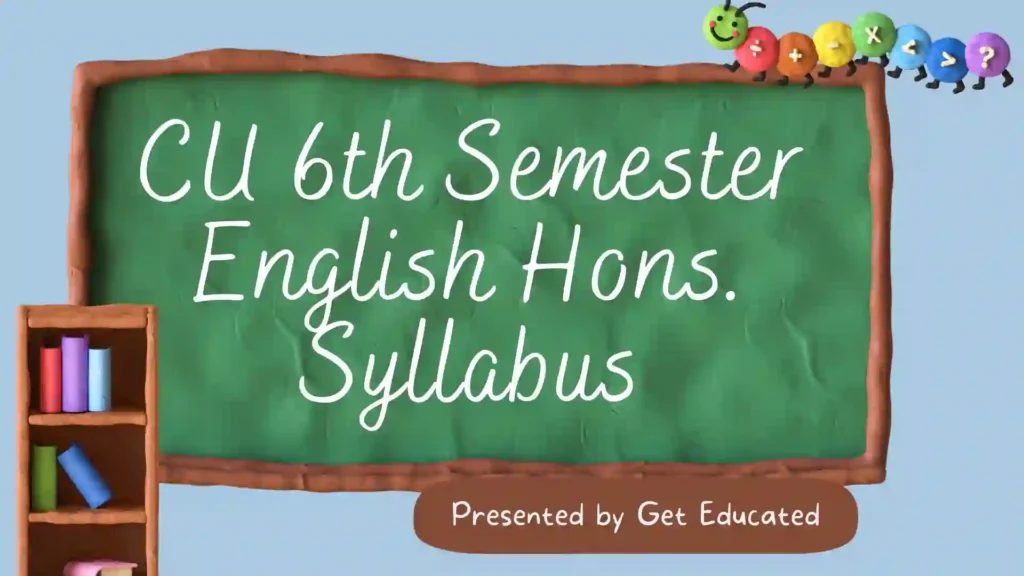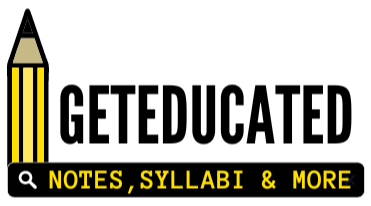If you’re looking for the Latest 6th Semester Syllabus for English (Hons.) of Calcutta University (CU), You’re in your destination. In this post, I will share detailed syllabus for each topic, prescribed by Calcutta University (CU).

Core Course (CC)
- CC13 – MODERN EUROPEAN DRAMA
- CC14 – POSTCOLONIAL LITERATURE
Discipline Specific Elective (DSE) – A
- DSE-A3 – PARTITION LITERATURE
OR,
- DSE-A4 – MEDIA AND COMMUNICATION STUDIES
Discipline Specific Elective (DSE) – B
- DSE-B3 – AUTOBIOGRAPHY
OR,
- DSE-B4 – TEXT AND PERFORMANCES
Detailed Course (CC)
CC13 – MODERN EUROPEAN DRAMA
Henrik Ibsen, Ghosts OR A Doll’s House
Bertolt Brecht, The Good Woman of Szechuan
Samuel Beckett, Waiting for Godot
End Semester Question Pattern:
Objective – 5 marks
One question of 20 marks out of two from each of the three
plays
Suggested Readings:
- Constantin Stanislavski, An Actor Prepares, chap. 8, ‘Faith and the Sense of Truth’, tr. Elizabeth Reynolds Hapgood (Harmondsworth: Penguin, 1967) sections 1, 2, 7, 8, 9, pp. 121–5, 137–46.
- Bertolt Brecht, ‘The Street Scene’, ‘Theatre for Pleasure or Theatre for Instruction’, and ‘Dramatic Theatre vs Epic Theatre’, in Brecht on Theatre: The Development of an Aesthetic, ed. and tr. John Willet (London: Methuen, 1992) pp. 68–76, 121–8.
- George Steiner, ‘On Modern Tragedy’, in The Death of Tragedy (London: Faber, 1995) pp. 303–24.
CC14 – POSTCOLONIAL LITERATURE
Poetry :
Pablo Neruda, ‘Tonight I Can Write’
Derek Walcott, ‘A Far Cry from Africa’
David Malouf, ‘Revolving Days’
Mamang Dai, ‘The Voice of the Mountain’
Novel :
Chinua Achebe, Things Fall Apart
Gabriel Garcia Marquez, Chronicle of a Death Foretold
End Semester Question Pattern:
Objective – 5 marks
Two questions of 15 marks each from poetry (out of three)
Two questions of 15 marks each (one from each) from novel (out
of four, two from each)
Suggested Readings:
- Frantz Fanon, ‘The Negro and Language’, in Black Skin, White Masks, tr. Charles Lam Markmann (London: Pluto Press, 2008) pp. 8–27.
- Ngugiwa Thiong’o, ‘The Language of African Literature’, in Decolonising the Mind (London: James Curry, 1986) chap. 1, sections 4–6.
- Gabriel Garcia Marquez, the Nobel Prize Acceptance Speech, in Gabriel Garcia Marquez: New Readings, ed. Bernard McGuirk and Richard Cardwell (Cambridge: Cambridge University Press, 1987)
- ‘Postcolonial Criticism’ in Peter Barry, Beginning Theory, Chennai: T.R. Publications
- Ania Loomba, Colonialism/Postcolonialism, London and New York: Routledge
Detailed Course (DSE – A)
DSE-A3 – PARTITION LITERATURE
Novel :
Amitav Ghosh, The Shadow Lines
Short Stories :
Protiva Basu, ‘The Marooned’, translated Subhasree Tagore, in The
Other Voice, eds. Tapati Gupta and Anil Acharya, Kolkata: Anustup
Manik Bandyopadhyay, ‘The Final Solution’, translated Rani Ray, in
Debjani Sengupta ed. Mapmaking: Partition Stories from Two Bengals,
New Delhi: Srishti
Sadat Hasan Manto, ‘Toba Tek Singh’, in Black Margins:Manto, New
Delhi: Manohar
Poetry :
Sahir Ludhianvi, ‘Twentysixth January’,
Birendra Chattopadhyay, ‘After Death: Twenty Years’
Sankha Ghosh, ‘Rehabilitation’, in RakhshandaJalil, Tarun Saint and
Debjani Sengupta eds. Looking Back: The 1947 Partition of India 70
Years On, New Delhi: Orient Blackswan, 2017
End Semester Question Pattern:
Objective – 5 marks
One question of 15 marks from novel (out of two)
Two questions of 15 marks each from short stories (out of three,
one from each)
One question of 15 marks from poetry (out of two)
Suggested Readings :
- Ritu Menon and Kamla Bhasin, ‘Introduction’, in Borders and Boundaries (New Delhi: Kali for Women, 1998).
- Sukrita P. Kumar, Narrating Partition (Delhi: Indialog, 2004).
- Urvashi Butalia, The Other Side of Silence: Voices from the Partition of India (Delhi: Kali for Women, 2000).
- Sigmund Freud, ‘Mourning and Melancholia’, in The Complete Psychological Works of Sigmund Freud, tr. James Strachey (London: Hogarth Press, 1953) pp. 3041–53.
OR,
DSE-A4 – MEDIA AND COMMUNICATION STUDIES
Introduction to Mass Communication
Mass Communication and Globalisation
Writing Pamphlets, Posters etc
Advertisements and Creating Advertisements
End Semester Question Pattern :
Questions on Mass Communication (Theory) – 20 marks
Report /Pamphlet Writing – 20 marks
Advertisement / Poster Writing – 15 marks
Recommended Readings :
- M.V. Kamath, Professional Journalism, New Delhi: Vikas Publishing House, 1980.
- Ambrish Saxena, Fundamentals of Reporting and Editing, New Delhi: Kanishka Publishers, 2007.
- Uma Narula, Handbook of Communication Models, Perspectives, Strategies, New Delhi: Atlantic Publishers, 2006.
- Stephen Cushion, Television Journalism, New Delhi: Sage Publications, 2012.
- Tony Feldman, An Introduction to Digital Media, Taylor and Francis, 2004.
Detailed Course (DSE-B)
DSE-B3 – AUTOBIOGRAPHY
Rabindranath Tagore, My Reminiscences, Chapters 1-15, New Delhi: Rupa & Co.
Mahatma Gandhi, Autobiography or the Story of My Experiments with Truth, Part I, Chapters 1 to 8
Binodini Dasi, My Story and Life as an Actress, pp 61-83, New Delhi: Kali for Women
Nirad C. Chaudhuri, Autobiography of an Unknown Indian, Book I, Mumbai: Jaico Publishing House
End Semester Question Pattern :
Objective – 5 marks
One question of 15 marks out of two from each of the texts
Suggested Readings :
- James Olney, ‘A Theory of Autobiography’ in Metaphors of Self: The Meaning of Autobiography (Princeton: Princeton University Press, 1972) pp. 3-50.
- Laura Marcus, ‘The Law of Genre’ in Auto/biographical Discourses (Manchester: Manchester University Press, 1994) pp. 229-72.
- Linda Anderson, ‘Introduction’ in Autobiography (London: Routledge, 2001) pp.1-17.
- Mary G. Mason, ‘The Other Voice: Autobiographies of women Writers’ in Life/Lines: Theorizing Women’s Autobiography, Edited by Bella Brodzki and Celeste Schenck (Ithaca: Cornell University Press, 1988) pp. 19-44.
OR,
DSE-B4 – TEXT AND PERFORMANCES
Historical Overview of Indian and Western Theatre
Classical, Modern and Contemporary Theatres
Historical Developments of Theatrical Forms
Folk Traditions
End Semester Question Pattern :
History of Theatre and Traditions of Theatre (in India and the
West) – 20 marks
Contribution of Eminent Individuals – 10 marks
Folk Traditions – 20 marks
Tagore as Theatrician – 15 marks
Recommended Readings :
- Kamalesh Datta Tripathi, ‘Rasa’ in Theatres of India: A Concise Companion, New Delhi: OUP, 2009.
- Kamalesh Datta Tripathi, ‘Natyasastra’ in Theatres of India: A Concise Companion, New Delhi: OUP, 2009.
- Ananda Lal, ‘Tagore as Theatrician’ in Rabindranath Tagore, Three Plays, Translated and with an introduction by Ananda Lal, New Delhi: OUP, 2001.
- Prasanna, Indian Method in Acting, New Delhi: National School of Drama, 2013.
- Walter Benjamin, ‘What is Epic Theatre’, Understanding Brecht, London and New York, Verso, 1973.
- Robert Leach: Theatre Studies: The Basics, Routledge, 2015.
- Sonia Moore, The Stanislavsky System: The Professional Training of an Actor, Penguin, 1984.
